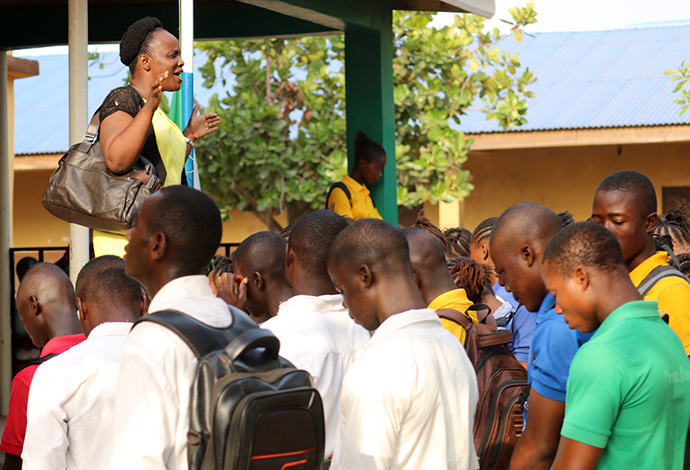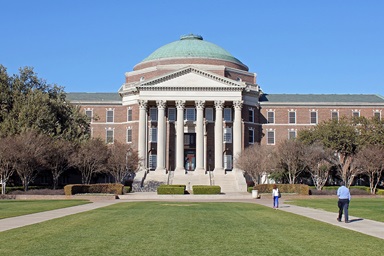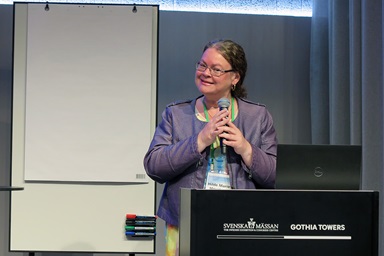Claves:
• La Iniciativa de Educación Escolar Gratuita y de Calidad del gobierno de Sierra Leona está afectando a la mayoría de las 350 escuelas metodistas unidas del país.
• Si bien el número de escuelas en todo el país ha aumentado y el salario de los/as maestros/as ha aumentado, algunos/as maestros/as y administradores/as tienen sentimientos encontrados.
• Las aulas superpobladas y las escuelas con personal insuficiente siguen siendo un desafío.
Hace tres años, el gobierno de Sierra Leona lanzó la iniciativa de Educación Escolar Gratuita y de Calidad por etapas, que proporciona admisión y matrícula sin costo a todos/as los/as niños/as en las escuelas aprobadas por el gobierno. Desde entonces, las listas escolares han aumentado, y el gobierno proporciona libros de texto, matrículas, autobuses escolares y subsidios para la administración escolar. El sueldo de los/as profesores/as ha aumentado al menos un 40%, y los/as hijos/as de maestros/as que han enseñado durante 10 años o más, califican para becas que financian su educación hasta la universidad.
Hay más de 350 escuelas metodistas unidas en Sierra Leona, la mayoría de ellas asistidas financieramente por el gobierno y afectadas por la iniciativa de educación gratuita. “La educación gratuita ha tenido un impacto positivo en nuestras vidas, pues vemos que más niñas asisten a la escuela porque no se les pide a los padres ningún pago, lo que solía ser un desafío" dijo Isatu Peacock, director de la Escuela Harford para Niñas, que es la más grande y antigua escuela metodista unida para niñas en Sierra Leona, un internado y una escuela diurna asistida por el gobierno.
A los/as niños/as de las escuelas secundarias gubernamentales y asistidas por el gobierno se les prestan libros de texto para materias básicas y los padres pueden proporcionar libros para las otras materias.
"Estamos viendo un cambio notable de donde estábamos antes a donde estamos ahora" dijo Moinina Sengeh, ministra de educación del país para la educación secundaria básica y superior, en una entrevista radial: “Hemos hecho todo lo que prometimos en nuestro manifiesto electoral sobre el manejo gubernamental de la educación” dijo citando la despolitización de las juntas de los comités de educación, la formación de los comités de gestión escolar y la contratación de monitores de control de calidad.

Lauretta Lengor realiza el devocional matutino en la Escuela Secundaria Metodista Unida Njagboima en Bo, Sierra Leona, en marzo de 2020, poco antes de que se anunciara el primer caso confirmado de COVID-19 en el país. Foto de archivo de Phileas Jusu, Noticias MU.
Sin embargo, la implementación del programa ha dejado a algunos/as administradores/as y maestros/as de escuelas metodistas unidas con sentimientos encontrados. Kai Jimmy, director de la Escuela Secundaria Koidu, una escuela metodista unida en el distrito de Kono, rico en diamantes, dijo que el gobierno se comprometió a agregar más edificios a las escuelas para acomodar la afluencia esperada de nuevos/as estudiantes. Pero su escuela aún no se ha beneficiado de esta medida. Jimmy agregó: “Nuestra escuela es la única con un laboratorio de ciencias equipado, por lo que atrae a muchos/as estudiantes, pero no podemos acomodar a todos/as que quieren estudiar acá”.
Jimmy se esfuerza por mantener una atmósfera de aprendizaje ideal aunque tiene mil setecientos estudiantes apiñados/as en un espacio limitado, con un promedio de 80 estudiantes por clase. Aunque está construyendo una estructura de seis aulas, los escasos recursos hacen más lento el proceso. Por lo que espera reducir el tamaño de las clases cuando se complete el nuevo edificio.
La promoción es esencial para el éxito de la educación gratuita, dijo Jimmy quien considera que los obstáculos incluyen las altas tasas de analfabetismo, el deterioro de los niveles educativos, la pobreza extrema y la corrupción.
“La educación gratuita abrió la puerta a los/as desfavorecidos/as, cuyos padres no podían pagar las cuotas. Incluso quienes se habían retirado están regresando a la escuela, lo que hace que el entorno de aprendizaje esté superpoblado. Pero algunos otros ni siquiera valoran la educación gratuita. Mientras no paguen, no lo valoran" comentó y dijo que algunos padres se niegan a llevarse o recoger los libros de texto prestados por el gobierno porque los/as estudiantes deben pagar por los daños o pérdidas, y agregó que algunos/as maestros/as estaban exigiendo dinero cuando se supone que los/as alumnos/as no deben pagar, comprometiendo así los estándares porque han sido sobornados.
La política de educación gratuita se implementa solo en las escuelas gubernamentales y en las asistidas por el gobierno. Los propietarios de las escuelas privadas financian el funcionamiento de sus escuelas y los/as estudiantes pagan la admisión, la matrícula y otros cargos.
Suscríbase a nuestro nuevo boletín electrónico en español y portugués UMCOMtigo
En la Escuela Secundaria Metodista Unida en Njagboima, Bo, los/as maestros/as se quejaron de la regularización de su estatus pues aunque algunos/as se graduaron hace años, sus salarios no reflejan sus calificaciones; otros/as fueron promovidos/as pero aún reciben salarios por debajo de sus promociones. Algunos/as fueron reclutados/as como nuevos/as maestros/as, pero ahora han trabajado durante años sin salario porque sus nombres no están en la nómina.
El gobierno introdujo la iniciativa educativa junto con la lucha contra la corrupción. Antes, hacer trampa en los exámenes era algo común. Los/as estudiantes protestarían, a veces violentamente, si no se les permitía hacer trampa. Desde entonces, la Comisión Anticorrupción, en operaciones de redada, ha allanado centros de examen, hogares y otros lugares donde se realizan exámenes en secreto. A veces, los/as estudiantes pagan una cantidad acordada para ser favorecidos/as en los exámenes.
Leonard Gbloh, secretario de educación de las escuelas primarias de la Conferencia de Sierra Leona, dijo que se ha avanzado en la contratación de maestros/as, que alguna vez fue un problema. Se han construido edificios adicionales y se han contratado y habilitado supervisores/as escolares. El gobierno ha aprobado escuelas adicionales para recibir asistencia del gobierno; se han proporcionado libros de texto y más niños/as asisten a la escuela. Pero Gbloh también sostiene que el gobierno debería volver a la mesa de trabajo si se quiere avanzar en la actualización de una educación de calidad. Las escuelas en comunidades rurales remotas carecen de personal, señaló. “Todavía tenemos escuelas en esas comunidades que solo tienen un/a maestro/a calificado/a” dijo.
Una forma de alentar a los/as maestros/as calificados/as a prestar servicios en estas comunidades es otorgarles asignaciones para áreas remotas, y agregó que el paquete de educación gratuita debe implementarse en fases, ya que es un proyecto que requiere capital y el gobierno está luchando para recaudar los fondos necesarios.
“El gobierno ha comenzado bien; ya no pagamos cuotas” dijo Sylvanette Tawah, una madre metodista unida cuyos hijos asisten a escuelas de la iglesia con la ayuda del gobierno. Sin embargo, dijo que hay brechas en el aprendizaje y el proceso educativo que deben llenarse, por lo que los padres a menudo tienen que pagar por clases adicionales. "Es necesario hacer más para garantizar una educación de calidad en las escuelas asistidas por el gobierno".
* Jusu es director de comunicaciones para La Iglesia Metodista Unida en Sierra Leona. Contacto con los medios de comunicación: Julie Dwyer. Le puede escribir a [email protected]. Para leer más noticias metodistas unidas, ideas e inspiración para el ministerio suscríbase gratis al UMCOMtigo.
** Leonor Yanez es traductora independiente. Puede escribirle a IMU Hispana-Latina @umcom.org




